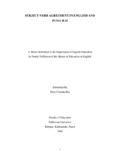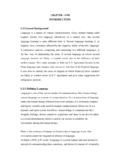Please use this identifier to cite or link to this item:
https://elibrary.tucl.edu.np/handle/123456789/242| Title: | Subject-Verb Agreement in English and Puma Rai |
| Authors: | Rai, Priya Chandra |
| Keywords: | language;pedagogical implications |
| Issue Date: | 2011 |
| Publisher: | Department of English Education |
| Abstract: | This research work, entitled “Subject–Verb Agreement in English and PumaRai” aims at identifying the S-V agreement system in the Puma Rai language and compare it with that of the English language. This thesis consists of four chapters: Introduction, Methodology, Analysis and Interpretation, and Findings and Recommendations.The objectives of this study were to find the Subject-Verb Agreement System of Puma and Compare and contrast it with that of English language.I used both primary and secondary sources to collect required data. I used the native speakers of th ePuma Rai language from Diplung, Mauwabote and Devisthan VDCs of Khotang district as the primary source of the data. I adopted the snowball non-random sampling procedure to sample the population. The sample size consisted of sixty native speakers from three selected VDCs ten male and ten female from each VDC.I met Mr. Shree Kumar Rai from Diplung and Parshu Rai from Devisthan, explained them the purpose of my visit and administered the questionnaire translating it into Nepali. After getting information from them,I asked them to identify other informants. I visited them in their villages, asked them the questions from the questionnaire in Nepali and got information. Thus,I visited different villages of Diplung, Mauwabote and Devis than village development committees. The data received from the primary source was not enough to give this work a complete form. That is why, I had to consult secondary sources of data. I consulted some books, magazines, journals andt heses. The major secondary sources were Chomsky(1957), Sapir(1921),Aarts(1997), Yadava(2004). On completion of this study, I have found some of the findings regarding S-Vagreement system of the Puma. Some of the major findings of the study are:Puma verbs agree with the categories of ‘number’, and ‘tense’. The change in agender and person of a subject does not affect the form of a verb in a sentence or clause.Both English and Puma verbs do not show agreement with the grammatical category of ‘gender’. |
| URI: | http://elibrary.tucl.edu.np:8080/jspui/handle/123456789/242 |
| Appears in Collections: | English Language Education |
Files in This Item:
| File | Description | Size | Format | |
|---|---|---|---|---|
| front page.pdf | 28.98 kB | Adobe PDF |  View/Open | |
| chapter.pdf | 179.05 kB | Adobe PDF |  View/Open |
Items in DSpace are protected by copyright, with all rights reserved, unless otherwise indicated.
